Dentures Coral Springs
Restore Your Smile and Your Confidence with Dentures
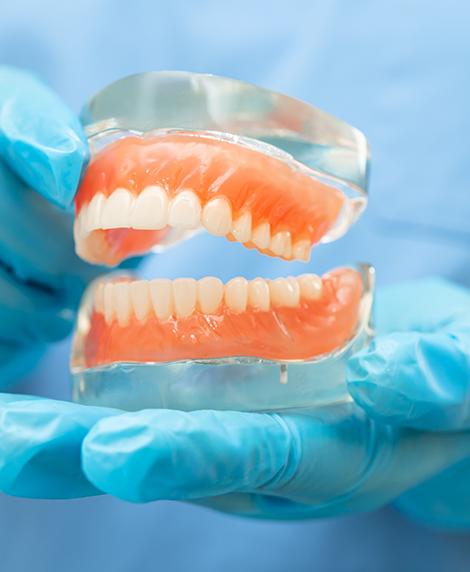
Is your smile less than attractive because of missing teeth? Tooth loss can lead to a number of problems. For example, you may not be able to speak as clearly, and eating might be more difficult. Also, your self-confidence could suffer simply because you know people see the gap in your smile. Fortunately, you can have a full, healthy smile again with restorative care. At Iglesias Dental Group, we offer partial and full dentures in Coral Springs to help patients like you restore what you've lost. And, thanks to our in-house lab, we’re often able to help patients recover their teeth in as little as one appointment!
Why Choose Iglesias Dental Group for Dentures?
- In-House Digital Lab for Seamless Workflow
- High-Quality Dental Materials
- Titanium-Reinforced Implant Dentures
Who’s a Good Candidate for Dentures?
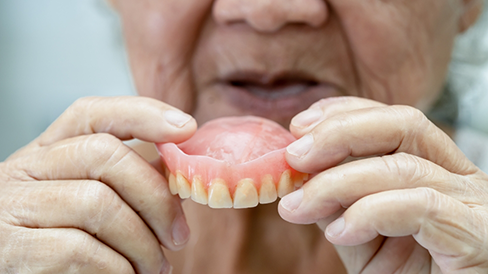
Missing some or all of your teeth can come with a plethora of disadvantages to your oral health and overall quality of life. That’s why, to restore your bite and smile, you should consider getting dentures as a convenient solution. With these prosthetics, you can enjoy your favorite meals while showing off pearly whites you can be proud of. However, our team will need to ensure that you’re eligible for the treatment before moving forward. Read on to learn how you can tell if you’re a good candidate for dentures as well as alternative restoration options.
Effects of Missing Teeth

It’s important to know what can cause missing teeth and the consequences of not replacing them. The most common reasons for tooth loss include decay, accidental injury, gum disease, and even poor oral hygiene habits. Certain bodily conditions can also contribute to the loss of multiple teeth.
Not replacing missing teeth can lead to drastic complications in your oral health. Firstly, due to a lack of stimulation in the bone tissue where the roots used to be, your jawbone can begin to deteriorate and weaken. This can allow any remaining natural teeth to shift out of place to fill the gap, increasing the risk of further tooth loss. Furthermore, you may experience side effects like receding gums, facial sagging, difficulty chewing, trouble speaking, and lower self-confidence.
What Qualifies You for Dentures?

Nearly any person who is missing any number of teeth can benefit from dentures. These prosthetics are effective and versatile, meaning they can be specifically designed for each patient to help restore their bite as well as address sensitive or decaying teeth. For this restorative treatment to work, you’ll need to have healthy gum tissue and strong jawbones to support them.
The number of missing teeth will also determine the kind of prosthetic you’ll receive. Depending on your situation, our team can provide you with partial dentures, full dentures, or implant dentures to restore your bite. Additionally, these artificial teeth are incredibly cost-effective, making them an ideal choice for patients who are working with a budget.
Alternative Tooth-Replacement Options
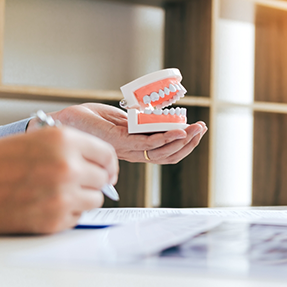
If you aren’t eligible for dentures, then you should consider our other tooth-replacement options, such as:
- Dental Bridges – These restorations can replace one or several missing teeth in a row. The process requires removing a small amount of enamel from the adjacent crowns on either side of the gap to support the bridge.
- Dental Implants – For a much more stable foundation for your new smile, dental implants are the gold standard. By embedding these titanium posts into the jawbone, which will serve as your new roots, you can expect a more lifelike and longer-lasting restoration that you can enjoy for a lifetime with proper care. This option does require that you have strong, healthy, and sufficient jawbone tissue to be successful.
Learn More About Dental Bridges
Learn More About Dental Implants
What Is a Partial Denture?
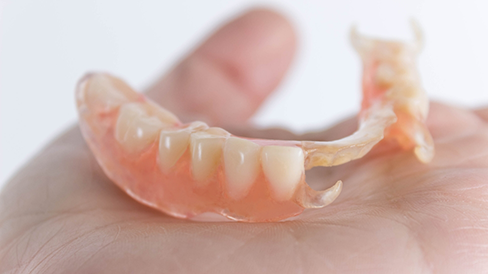
A removable denture is made of false teeth that are attached to a metal frame. We take molded impressions of your mouth to ensure that the false teeth fit comfortably between your own and do not interfere with opposing teeth when you bite. Clips that attach to teeth adjacent to the gap in your smile hold a partial in place.
A fixed partial, also called a bridge, is an oral device that is mounted over healthy teeth or dental implants. A bridge is made up of two dental crowns that are fused to one or more free-standing replacement teeth. Once a fixed partial is bonded to abutment teeth, you have a permanent solution to tooth loss.
What Is a Full Denture?
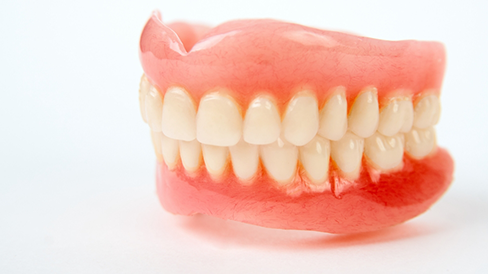
Full dentures are for patients that are missing all of the teeth along the top or bottom arch. This prosthetic is made of false teeth set on an acrylic base that is colored to look like natural gum tissue.
If the teeth along your upper ridge are gone, then a denture with an open palate may be preferable in order to give you greater comfort and a better sense of taste. Rest assured that your dentures will always fit comfortably and securely without irritating your gums.
For even greater confidence when you eat and talk, ask about implant-retained dentures. These are attached to small, implanted posts that are surgically embedded in your jawbone. They are typically more secure and permanent than traditional dentures.
The Benefits of Dentures and Partials
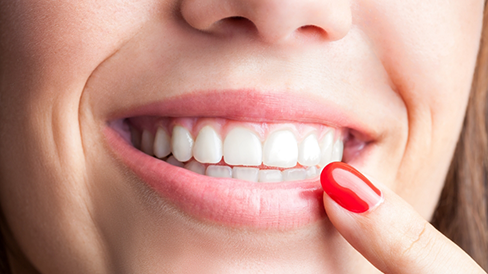
For most people, the greatest benefit is smiling back at them in the mirror. However, there are other important considerations. First, teeth replacement is important to your oral health. Just one missing tooth increases the risk of decay in other teeth as well as gum disease.
In addition, tooth loss sometimes leads to malnutrition if a patient is not able to chew a variety of healthy foods including fresh fruits and vegetables.
Understanding the Cost of Dentures

Your financial situation should never prevent you from replacing your missing teeth. Contrary to many rumors, dentures are affordable for people from all walks of life. There’s not a flat fee for dentures because everyone’s mouth is unique. We take the time to create a personalized plan to restore your smile, so several factors affect the cost of dentures in Coral Springs. Don’t worry, we have the solutions you need to invest in a high-quality prosthetic to smile confidently.
Factors That Affect the Cost of Dentures
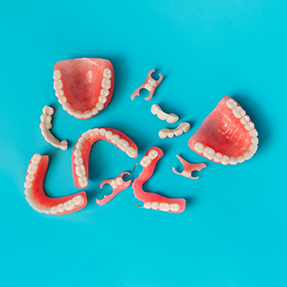
Everyone’s mouth is different, just like your fingerprints. Therefore, it’s impossible to use a set treatment plan to rebuild your smile. After examining your mouth and learning more about your preferences, your denture dentist in Coral Springs will create an individualized approach, which will include:
- Preparatory treatments
- Type of denture
- Number of arches
- Materials used
You don’t want to focus on the price tag when choosing materials for your new smile because it’s true, you’ll get what you pay for. Your dentist will help you choose durable, comfortable materials for your denture to ensure your investment lasts.
Are Implant Dentures More Expensive?
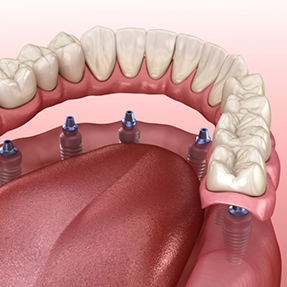
Yes, implant dentures are more expensive upfront than traditional prosthetics; however, they are the most affordable overall. An implant denture recreates the roots and crowns of missing teeth. This provides a nearly perfect replica of your real smile. You can’t put a price on the comfort and satisfaction you’ll gain.
Besides improving your quality of life, dental implants can last for over 30 years with the right maintenance. Your implant denture can pay for itself because you won’t have to replace it every few years. Dental implants also keep your jawbone strong to improve your oral health. You’ll avoid common issues caused by tooth loss to lower your long-term dental expenses.
Does Dental Insurance Cover Dentures?

Most dental insurances can be used to offset the amount you’ll pay for dentures in Coral Springs. It’s unlikely your policy will cover the entire cost, but you can use your benefits to lower your out-of-pocket responsibility for certain steps in your plan. After meeting your deductible, you can use your annual allowance to help pay for the consultation, tooth extractions, and other aspects of your treatment. A member of our team will work on your behalf with your dental insurance to maximize your benefits. They’ll explain how your coverage is being used and if there’s any remaining balance.
Other Options for Making Dentures Affordable

We offer several financial solutions to cover any out-of-pocket expenses, such as:
- Traditional Payments: We accept all forms of traditional payment, including cash, checks, and credit cards.
- Third-Party Financing: Pay for your dentures using monthly installments through a third-party financing company, like CareCredit.
Rest assured; you’ll know exactly what you’ll have to pay before committing yourself to anything. We are transparent about your estimate, so you won’t be surprised by any hidden fees. If you have questions about paying for dentures, or you’re ready to schedule your consultation, contact our office today.
Dentures FAQs
How much do dentures cost?
The price of dentures can vary greatly from patient to patient. Some of the factors that influence your cost are:
- The number of teeth you’re replacing
- Whether you secure your dentures with dental implants
- Whether you’ll need any preparatory work such as gum disease therapy or tooth extractions
- Your level of insurance coverage
At Iglesias Dental Group, we work with a long list of dental insurance providers. If you don’t have insurance or need help paying for your new teeth, we can help you apply for a low-interest loan through CareCredit.
Do I still need to see a dentist for checkups with dentures?
Even if you have no natural pearly whites remaining, you should still see your dentist in Coral Springs at least twice a year for a checkup. We can make sure you don’t have any issues like gum disease and evaluate any natural teeth you have left. We can also examine your dentures to determine when they’ll need to be repaired or replaced.
Can I sleep in my dentures?
We don’t recommend sleeping in your dentures. Taking your dentures out will give your gums and jawbone a few hours to recover from the pressure of wearing them all day. It’s also the perfect cleaning opportunity. Before you go to bed, let your dentures soak in either denture cleanser or room temperature water. Soaking them in hot water or letting them dry out at night could cause them to change shape and lose their comfortable fit.
How do I clean my dentures?
It helps to scrub them with a special denture brush at least once a day. This prevents plaque from building up and causing oral infections. Instead of toothpaste, use a special denture cleanser. Toothpaste contains chemicals that might be abrasive to your replacement teeth. You can bring your denture during your regular periodic visits for a professional ultrasonic cleaning at no extra cost.
Additionally, you can prevent bacterial buildup by rinsing your dentures after eating and before putting them back into your mouth.
How do I eat while wearing dentures?
It can take several weeks to get used to eating with dentures. Try eating small bites of soft food at first and gradually work your way up to larger bite sizes and heartier foods. Remember to apply even chewing pressure with both sides of your mouth so the dentures don’t become dislodged. Applying a small amount of denture adhesive before eating can also help stabilize them.
I Need a Checkup & Cleaning I Need a Dentist for My Child I Have a Cavity or Broken Tooth I am Missing One or More Teeth I Want to Enhance My Smile I Have a Dental Emergency I Need Oral Surgery I am Worried About Gum Disease I Have Jaw Pain/Headaches I Am Afraid of the Dentist I Snore/Have Sleep Apnea View Our Services
